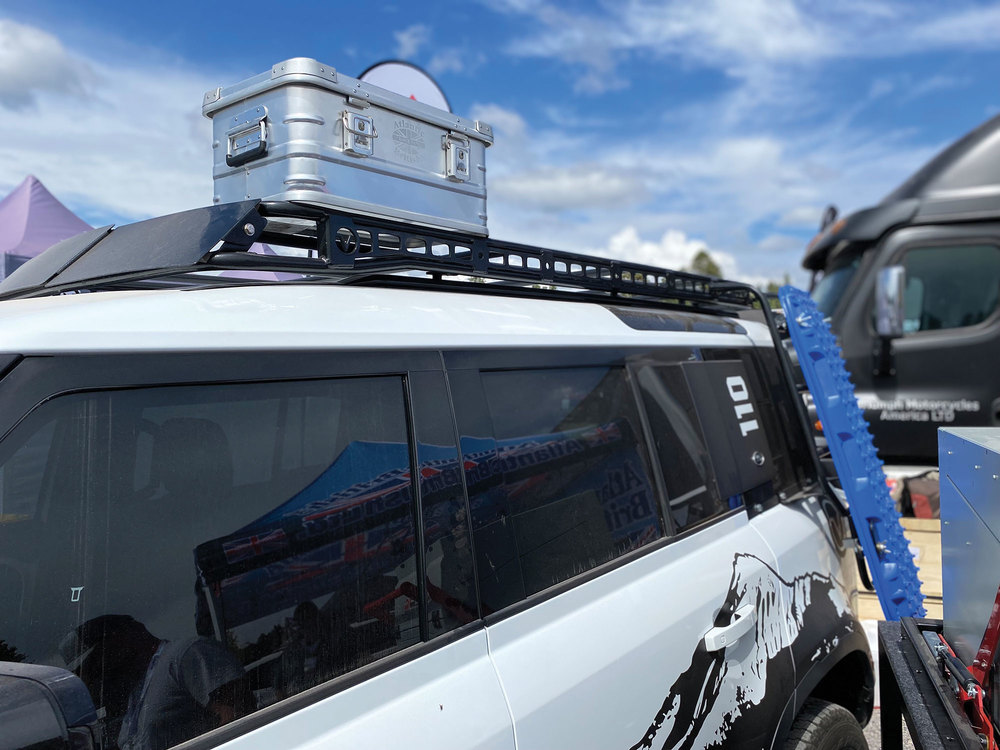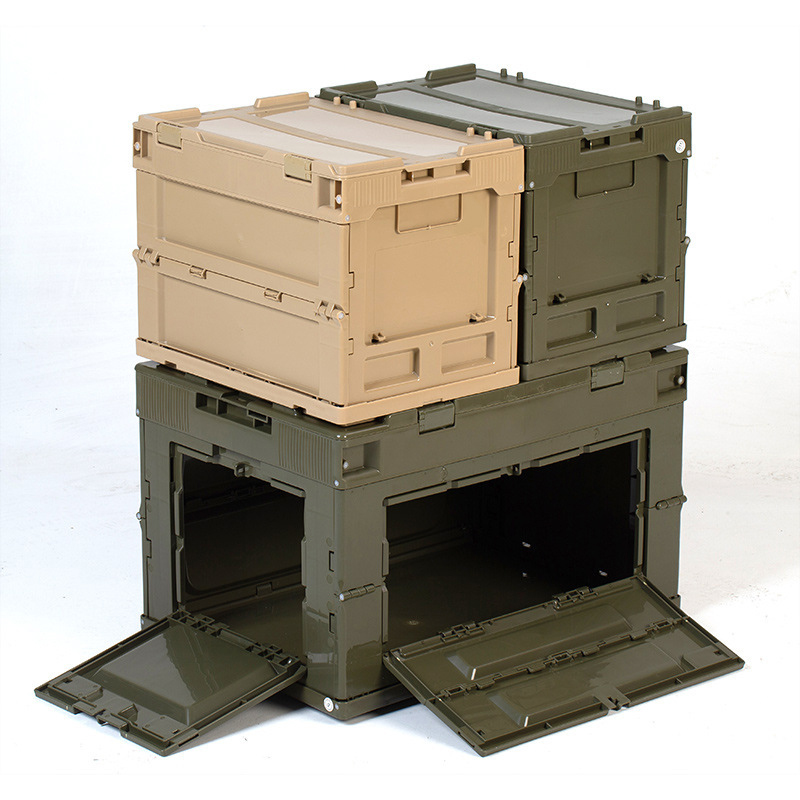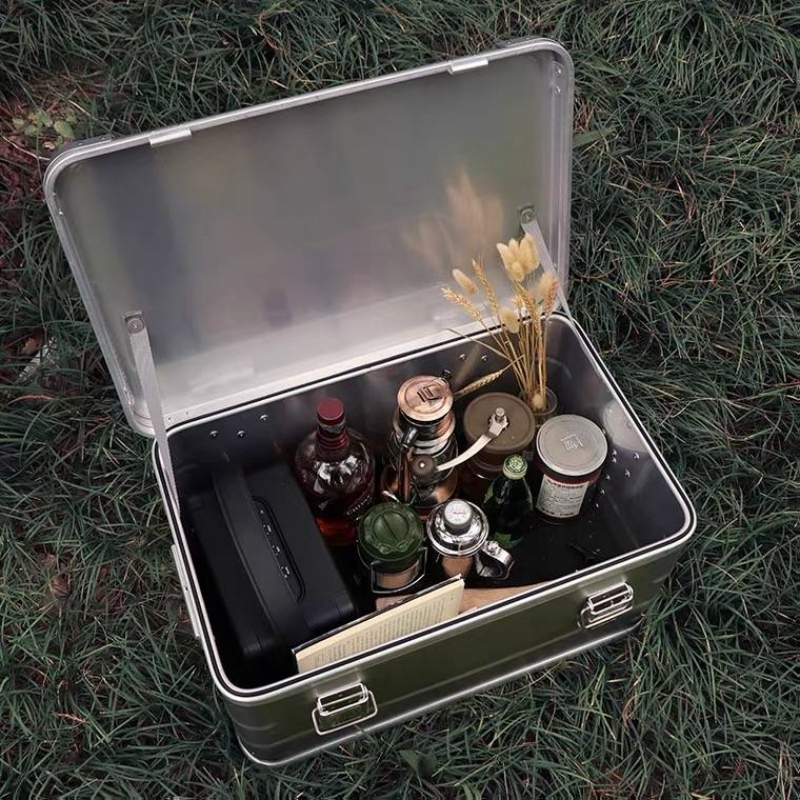What do you use to store all your gear?

Like many of you here, I'm a container geek and I've used everything from <$10 plastic totes to >$300+ Pelican and Alu-Box cases. I live in the Midwest and moisture is always a factor when packing. I've ruined gear and had some soggy camping experiences. Let's just say that I've acquired a lot of containers over the years. My love for Overlanding came from a career in the US Army. We did a lot of route recon work that was very similar to Overlanding (off-highway travel by day, camp at night). We would spend hours going over load plans to squeeze every inch of space out of our Humvees and trailers. Now that I'm retired, I got lazy and just started shoving gear wherever with no real plan. Now I'm back to drafting load plans.
One thing about vehicle camping/Overlanding that my wife and I got tired of real quick was all the loading/unloading of containers and searching through containers to find stuff. If I could go back and give myself some advice when I was just starting out, it would be this:
- Don't get laser-focused on a certain type of container, or how cool it will look on your rack. Function over form.
- Make a list of all your gear that you pack for an adventure.
- Divide up that gear into kits, or systems. Like kitchen, sleeping, vehicle recovery, cooler items, ...
- Rank those kits based on:
- Do I need to access it while on my trip or on the trail, or can it wait until basecamp?
- How much protection from the elements does this kit require? Obviously, I put my camera kit in a padded Pelican case in the vehicle, while the toilet kit can travel in a much cheaper container.
- How much internal space is needed for this particular kit? I often lay everything out, then go container shopping.
- How much external space will this container take up? An aluminum case has a much higher internal to external dimension ratio compared to a plastic box like a Pelican or Plano.
- Small items inside larger containers are elusive, especially in the dark. Use smaller containers within larger ones. Clear plastic containers work best for me and cut down on the rummaging around.
- Think about safety. Tall, heavy items on the roof rack will definitely affect stability when off camber. Try to keep roof rack items as low profile as possible. No taller than a Jerry can for sure. Also think about securing your roof load with proper straps.
- Sketch a load plan, detailing where each kit goes on the vehicle/trailer. This is especially useful for other members of your party so they can help pack/unpack.
- If you have several containers that are alike, come up with a way to label/mark them. You will curse everytime you take the wrong container down from the rack. I've seen other folks use reflective numbers or markings so they're easy to find at night. Or put all those Overland decals to good use and mark your containers with those!
- It may seem silly, but I spend hours in the driveway loading/unloading my kit to get it just right.
- Have fun! After all this organization and planning, it's time to enjoy your kit and the fruits of your labor! Your kit should work for you, not the other way around.
Hopefully, you didn't get into Overlanding just to become a Sherpa and schlep gear around. Make it an adventure!
Plastic Storage Boxes vs. Aluminum Boxes: Understanding the Differences
Plastic storage boxes and aluminum boxes are two popular options for various storage needs. Understanding their differences can help you make an informed decision when choosing the most suitable option for your specific requirements. Here, we'll explore the key contrasts between plastic storage boxes and aluminum boxes.
- Material Composition:
Plastic Storage Boxes: These boxes are typically made from durable and lightweight plastic materials such as polypropylene (PP) or high-density polyethylene (HDPE). Plastic offers flexibility, impact resistance, and resistance to moisture and chemicals.
Aluminum Boxes: Aluminum boxes are constructed from lightweight aluminum alloy, which provides strength and durability. Aluminum is known for its corrosion resistance, thermal conductivity, and electrical conductivity.
- Strength and Durability:
Plastic Storage Boxes: Plastic boxes are generally strong and can withstand moderate impact. However, they may not be as robust as aluminum boxes and could be prone to cracking or warping under heavy loads or harsh conditions.
Aluminum Boxes: Aluminum boxes offer exceptional strength and durability, making them suitable for heavy-duty applications. They can withstand rough handling, extreme temperatures, and exposure to harsh environments without compromising their structural integrity.
- Weight:
Plastic Storage Boxes: Plastic boxes are lightweight, which makes them easy to handle and transport. This characteristic is beneficial when dealing with frequent movements or when weight restrictions are a concern.

Aluminum Boxes: While aluminum boxes are sturdy, they are still relatively lightweight compared to many other metals. They strike a balance between strength and weight, offering a robust solution without adding excessive weight to the overall load.
- Security and Protection:
Plastic Storage Boxes: Plastic boxes typically feature secure snap-on lids or interlocking systems that provide good protection against dust, moisture, and pests. However, they may not offer the same level of security as aluminum boxes in terms of tamper resistance or protection against theft.
Aluminum Boxes: Aluminum boxes often come with reinforced corners, heavy-duty latches, and lockable features that enhance security. They provide a higher level of protection against unauthorized access and can safeguard valuable or sensitive contents.
- Heat and Fire Resistance:
Plastic Storage Boxes: Plastic has lower heat resistance compared to aluminum. When exposed to high temperatures, plastic may melt or deform, potentially damaging the contents inside.
Aluminum Boxes: Aluminum has excellent heat resistance, allowing it to withstand high temperatures without warping or melting. This characteristic makes aluminum boxes suitable for applications where heat or fire exposure is a concern.

- Aesthetics and Customization:
Plastic Storage Boxes: Plastic boxes are available in various colors, styles, and sizes, offering a wide range of customization options. They are often transparent or translucent, allowing easy visibility of the contents.
Aluminum Boxes: Aluminum boxes usually have a sleek and professional appearance, with a metallic finish. While there are limited customization options, they can be anodized or coated to enhance aesthetics and provide additional protection against corrosion.
Conclusion: Both plastic storage boxes and aluminum boxes have their unique strengths and applications. Plastic boxes are lightweight, affordable, and versatile, making them suitable for everyday storage needs. On the other hand, aluminum boxes offer superior strength, durability, and security, making them ideal for heavy-duty or specialized requirements. Assessing your specific needs, including factors such as load capacity, environmental conditions, security, and aesthetics, will help you determine which option best fits your storage requirements.
KASSICO, a leading
aluminum box factory in Ningbo, China, has 21 years of production experience. Since 2015, combining the advantages of
camping kitchen boxes, KASSICO has expanded its business scope to outdoor camping gear and equipment, including design and supply of
camp kitchenware,
camp furniture, camping tent,
camping lights and
tools, etc. With multiple sets of outdoor products solutions, kassico provides customers around the world with hundreds of innovative and affordable outdoor products, we will be your reliable suppliers, and we will try our best to serve you better and to be your honest partner.
More Detail:
https://www.kassico-outdoor.com/



